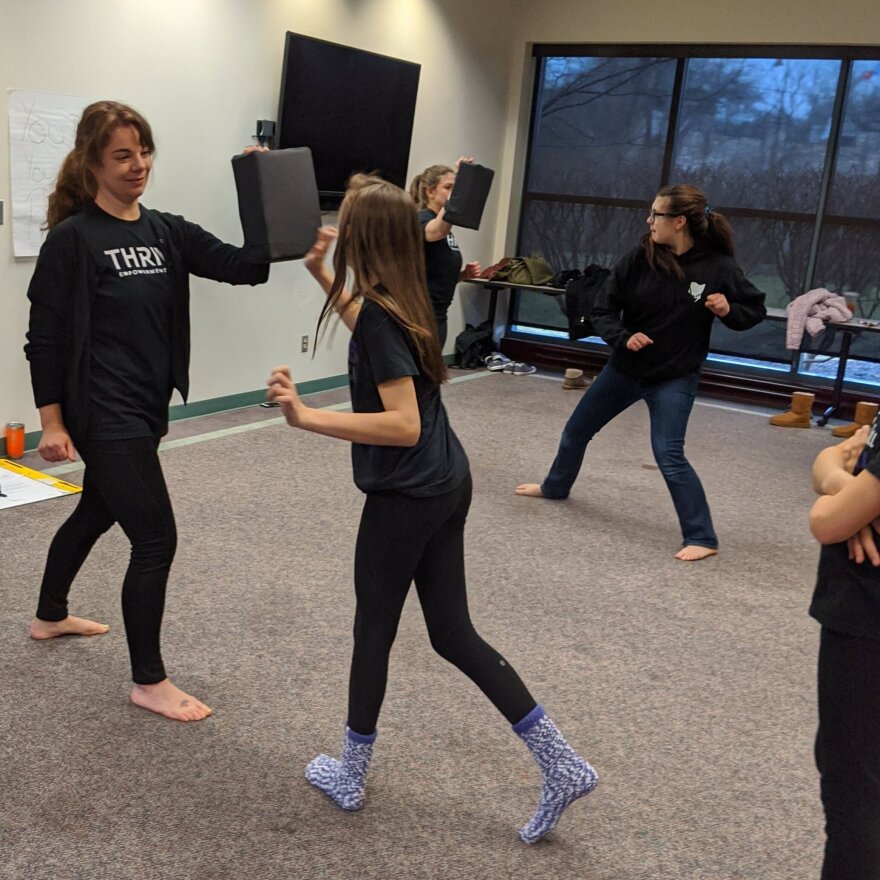Brazilian Jiu Jitsu, or BJJ, is a self-defense martial art that uses grappling techniques. Athletes fight primarily on a mat, and it is a male-dominated sport.
In Northern Kentucky, just outside Cincinnati, the Thrive Empowerment Center uses a trauma-informed approach to teach BJJ. The business co-founders said their approach is unique and makes the sport accessible to women, queer people, and survivors of violence that are traditionally underrepresented in the sport.
Providing an opportunity
Laughter and friendly banter filled the air during one BJJ class at Thrive. Two women grabbed each other on the mat.
"Switch your arms and go the other direction," the instructor said. "You're going to turn the body."
The student struggled with the new move, so the instructor got consent to demonstrate it on another person in the class.
"Can I use your body"? The instructor said.
"Yes," the student replied.
"We're going to interlock your feet," the instructor said while demonstrating the move to the class.

Thrive members must always ask for permission before they grapple with each other. Prioritizing consent like this is unusual for a BJJ gym, and it's one of the reasons why Lauren Bailey co-founded the center, she said.
"I grew up with very little body confidence and actually a lot of body loathing. I grew up a child of the late 80s and early '90s, where basically if you weren't a Victoria's Secret model with your ribs popping out, you were hideous." Bailey said. "And I believed that about myself for a very long time. And then fast forward to my late 30s when I found martial arts, and this was finally a place where I felt like my mind and my body were on the same team."
I was on top of the world that day because the questions that my body still had about its capability were finally answered.Lauren Bailey
Soon after beginning Brazilian Jiu Jitsu training, Bailey said she set her sights on winning a match in her first competition, and eventually, she did.
"I'm on her back and I used a submission, which is probably one of the most intimidating name submissions, called a 'Rear Naked Choke,' where I kind of looped my arm around her neck and kind of walked my legs around her and I just held on. I held on for dear life." She said, "I was on top of the world that day because the questions that my body still had about its capability were finally answered."
Bailey and her co-founder, Lindsay Falcon, said they wanted others to have this experience, so they founded Thrive.
"But it really was rooted in me knowing how therapeutic jujitsu was for me and wanting to share that, provide the opportunity for others to have that, not only women, but also LGBTQ+ folks who don't have that opportunity, maybe in traditionally male-dominated gyms where they don't feel safe or welcome," Falcon said.
Falcon said that as she learned from the people who came to Thrive to take classes, she decided to pursue more formal education in trauma-informed counseling because she realized how relevant it was to her self-defense company.
"The experience of going through the Master's in Social Work program has really just given me access to a deeper understanding of trauma," Falcon said.
Thrive now incorporates mental wellness activities, such as mind-body check-ins and affirming "Yes Circles," into their classes, along with their emphasis on consent.
This story was produced at the Eichelberger Center for Community Voices at WYSO. Culture Couch is supported by the Ohio Arts Council.








